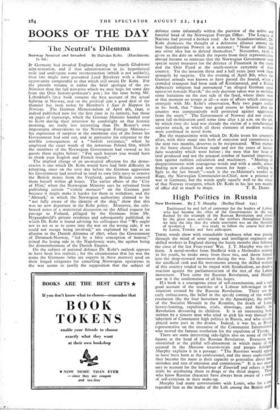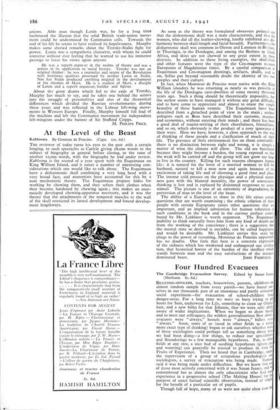High Politics in Russia New Horizons. By J. T. Murphy.
(Godley Head. iss.) Embittered by and full of contempt for the leaders of Labour, who had become the allies of the Governments in the war, flushed by the triumph of the Russian Revolution and stirred by the great mass activities of the workers throughout Europe, we held the idea that the whole continent was on the threshold of revolution. I . . was ready to follow the course laid down by Lenin, Trotsky and :heir colleagues.
THESE words show with remarkable frankness what was passing through the mind of some young and intelligent engineers and skilled workers in England during the hectic months that followed the close of the last Four-years' War. J. T. Murphy was one of them. A metal-worker from Sheffield with a Methodist training in his youth, he broke away from these ties, and threw himself into the shop-steward movement during the war. In those days the unofficial rank and file movements among the skilled workers of this country tended to be tinged with Syndicalism, no doubt a reaction against the parliamentarism of the rest _of the Labour movement. Then came the Russian Revolution, and Murphy saw in it the confirmation of all his hopes. Ws book is a courageous piece of self-examination, and a vent' good account of the reactions of a Labour left-winger to the situation created by the Russian Revolution. There are the early enthusiasms, the belief in the speedy coming of the world- revolution like the four horsemen in the Apocalypse, the arrival of the Socialist Messiah in the Kremlin, the death of Lenin. heresy-hunting, expulsions, trials, shootings, and finally the Revolution devouring its children. It is an interesting book. written by a sincere man who tried to pick his way through the labyrinth of Communist high politics in Russia, and who actual. played some part in the drama. Indeed, it was he, as British representative on the executive of the Communist International, who moved the famous resolution for the expulsion of Trotsky.
There are some interesting side-lights also on some of the bg figures at the head of the Russian Revolution. Everyone was
astonished at the pitiful self-abasement in which many of the
accused in the Moscow treason-trials and purges indulged. Murphy explains it in a passage : " The Russians would appear to have been born at the confessional, and the more sophisticated they become the more is their capacity to generalise about their mistakes and sins of omission and commission." It is not neues'
sary to account for the behaviour of Zinovieff and others at these trials by attributing them to drugs or the third degree. Tot who know Russian character have always been aware of a stoat of self-criticism in their make-up.
Murphy had many conversations with Lenin, who for a regarded him as the leader of the Left among the British trade' unions. Able man though Lenin was, he for a long time harboured the illusion that the solid British trade-union move- ment could be undermined by Communist cells. Towards the end of his life he seems to have realised its hopelessness. Murphy makes some shrewd remarks about the Trotsky-Stalin fight for power. Lenin was a sympathetic character, with whom he could converse without ever feeling that he wanted to use -his immense prestige to force his views upon anyone.
He was a superb explore: in the realms of theory and was a i genius in its application to social history. Trotsky was not an original thinker : he was a journalist and orator of the Revolution with histrionic qualities possessed by neither Lenin or Stalin. Nor has Stalin produced anything original in the development of the theories of Marx. He is a student of Marx, a disciple of Lenin and a superb organiser, builder and fighter.
About the great drama which- led to the exile of Trotsky, Murphy has much to say, and he takes one behind the scenes into the struggle of personalities and also of the theoretical differences which divided the Russian revolutionaries during these years and was reflected in the Labour left-wing move- ments in Western Europe. Finally, Murphy himself fell foul of the machine and left the Communist movement for independent left-wingism under the banner of Sir Stafford Cripps.
M. PHILIPS PRICE.



























 Previous page
Previous page